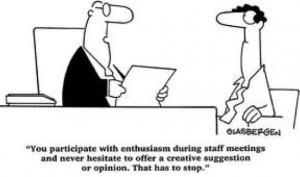
Many ad agency leaders dread annual account management performance reviews.
It’s not that performance reviews are not a good idea.
If you agree with the old adage that your employees are your company’s greatest asset then you probably support the notion that talking to your front line account staff about their progress with your company is fundamentally a good thing.
And why wouldn’t you want to spend some time making your account handler feel loved by engaging them in conversation about their career aspirations when this might just mean they will want to stay around a bit longer?
Besides, failing to retain your best account handlers in an industry where your product IS your people is one of the highest hidden agency costs and can spell financial disaster:
1. Hefty recruitment fees
2. ‘Lost’ bedding in time of new recruit
3. Cost of making the hire wrong
4. Threat of losing your top clients (who have developed a high degree of trust with departing account handler)
But alas far too often performance reviews are not set up or executed in the right way or by the right person and can create inordinate amounts of administration and ultimately lead to staff de-motivation.
Here are 5 reasons most reviews don’t work:
1. Annual review is forgotten during the rest of the year
It’s as if the annual performance review is an old suitcase gathering dust in the wardrobe until it’s needed again for a summer holiday. Mostly forgotten, often a bit of a nuisance getting in the way and largely redundant until it’s time to use it again.
One of the purposes of an annual review is to set goals/objectives against which performance can be measured and then referred to during reviewer/reviewee informal catch ups throughout the year. Otherwise often they are simply forgotten.
2. Reviewers (line managers) are not equipped with the skills or expertise
Rarely does any agency reviewer receive formal guidance and training for how best to carry out a performance review.
This leaves the reviewer exposed and the reviewee in the hands of someone who at any moment could inadvertently say or do something to make them want to flee.
A few examples from past experience;
– Saying “well, that’s just the way it is here, you have to get used to it” when the reviewer was asked why the reviewee was passed over for promotion
– Holding the scheduled one hour review in a cafe and the reviewer cutting the meeting to 20 minutes due to other ‘urgent’ matters needing their attention
– Turning the conversation back to the reviewer during 80% of the conversation
Comical if these incidences hadn’t lead to the reviewee feeling so aggrieved that they left the company.
Having the wrong person or someone who is unprepared carrying out a review is dangerous territory.
3. Reviews are based on ‘latest performance’ and not reflective of the review period
Because annual reviews are resuscitated once a year and are not usually kept as ‘working documents’ throughout the year, the focus of the review is often based on what’s just happened.
This means that even if an account handler has performed extremely well and achieved much during the first half of the year, if something happens to lead to a poor performance in the second half of the year, the review is dominated by that incident.
Unfair?
4. There is no follow up
It’s the reviewer’s responsibility to ensure the performance review isn’t left hanging and that anything agreed at the meeting is captured in writing and kept on record.
Frequently however the reviewer’s schedule is packed with client-related issues, many of which are urgent and therefore following up on a review can take a back seat.
Another proverbial nail in the coffin for an account handler’s sense of importance and hence motivation levels.
5. New account handlers don’t see the review performance criteria when they join
When account handlers pass their first year (or 6 months) at a company, they are told they will be ‘reviewed’.
Rarely however is the criteria against which their performance will be reviewed shared with them when they first join the company.
So how can the account handler know that their performance meets company expectations?
Unfair?
If you need to carry out a performance review with one of your team but don’t want to get it wrong, you will find a step by step guide to how to carry out a performance review for account handlers which includes a review template, dos and don’ts and some additional resources including links to videos.
So do you have any performance review horror stories to share?

